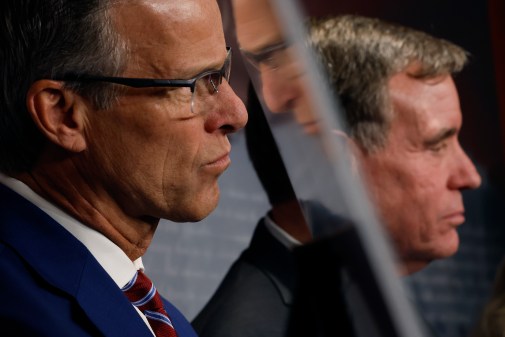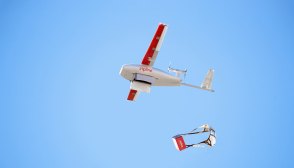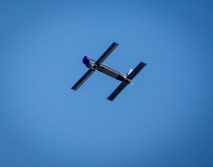As the possibility of the Federal Aviation Administration missing the congressionally mandated 2015 integration deadline for small unmanned aircraft systems grows, several companies have banded together through a lobbying endeavor to bring Congress, the FAA and the White House closer to a “yes” on small drone integration.
The Small UAV Coalition boasts members from Amazon Prime Air, Google X, GoPro, and several drone and UAS technology manufacturers, while, according to its executive director, the coalition’s goal is simply to get the message out about how commercial entities need the ability to test and develop their technology on American soil.
Announced this month at the Association for Unmanned Vehicles Systems International Cascade conference, the Small UAV Coalition focuses exclusively on commercial and hobbyist use of drones.
Michael Drobac, the coalition’s executive director, told FedScoop in an interview that the coalition’s members view the organization as a way “to capture the hearts and minds of consumers” and to explain the range of potential uses for UAVs. Although there are many scenarios involving what some might consider trivial usage, “there is also a major demand for [UAVs] in terms of disaster management, and search and rescue,” Drobac said. “There are potentials to do things in a much more efficient manner. This is one of them. The members really wanted to get that message out and really wanted to move to a place where we can see some advanced testing and operation.”
But with the current state of the UAS industry, and the projection from the FAA’s inspector general that the agency will miss the 2015 integration deadline, companies with an interest in drone technology don’t see much hope for the FAA to move faster on testing and final integration.
“There’s still a lot of work to be done,” said Drobac, who also works as a senior policy adviser at lobbying group Akin Gump Strauss Hauer & Feld LLP. “The FAA is handling this the way you would expect the FAA to handle it.”
Late last month, the FAA and Transportation Department Secretary Anthony Foxx announced they had approved an exemption request for six petitions filed under the Motion Picture Association of America to allow the use of drones under a closed movie set and under certain parameters.
“I thought it was a good moment when the six petitions were approved; however, they were approved within very restricted and very restrictive conditions,” Drobac said. “We’re hopeful that future petitions that are approved will not necessarily have to be a cookie-cutter model of what was approved for the production companies in the closed-set filmmaking.”
One of the Small UAV Coalition’s members, Amazon Prime Air, filed an exemption request with the FAA under Section 333 of the 2012 FAA Modernization and Reform Act to test package delivery services using drones. The agency has yet to respond to the request.
Yet Drobac said commercial entities wanting to test their drones may not necessarily benefit from the restrictive parameters that were allowed in the MPAA’s exemption request.
“I think one of the big issues that will be a big part of the discussion going forward, especially as we move into 2015 and the FAA reauthorization, is how does the U.S. intend to approach these issues?” Drobac said. “We have seen incredible growth and rapid development and evolution in other countries and approval of commercial operations in limited cases, but we’re seeing an incredible degree of thought and analysis is being put to this, and I wouldn’t say that we’re not at the same place that other nations are in terms of the ability to do these things.”
With other nations progressing and welcoming drone technology, and companies like Google X’s Project Wing testing in other countries, Drobac said commercial drone companies could find it more economically beneficial to invest in operations outside of the country.
“I think we’re less nimble in this space than, for example, other countries are,” Drobac said. “That will lead to companies going overseas, taking their technologists and their physicists and their engineers and setting up shop overseas. That’s certainly something we do not want to see.”
According to Drobac, the companies will not actively circumvent current law or regulation requiring them to not use or test drone technology, especially without a proposed rulemaking in place by the 2015 deadline, but the coalition does actively advocate for a creative solution to expediting the integration timeline.
“There will be absolutely no circumvention on our part, and we can say that comfortably because there won’t be any rule by the end of 2015,” Drobac said. “I’m not going to circumvent anything unless, of course, there’s an expedited timeline, and we can open up a dialogue around the technology that exists and find a way to get to yes. If that’s not the way it’s going to happen, then we’re going to have to be more creative.”
Some of the FAA’s claims about whether the technology is sufficient and safe enough for drone integration right now, like when Administrator Michael Huerta said the agency was prioritizing safety over the 2015 deadline at the opening of one of the FAA’s six test sites in August, are not backed up by real claims, Drobac said.
“Those who suggest that we are somehow in need of more time and need to slow things down but cannot provide to me a good assessment to where the technology is – that’s not a sufficient answer,” Drobac said. “That will not help us thrive as an innovative and technologically advanced nation. That’s why we have a group of excited and passionate members, because they view and see what’s possible.”
Reception to the group among the UAS industry and Congress has been “unbelievable,” Drobac said. The coalition’s website received more than 160,000 hits on its second day.
“The final question at our meetings have been ‘how can I help you?’” Drobac said. “That’s great. That’s the exact question I want to hear.”





